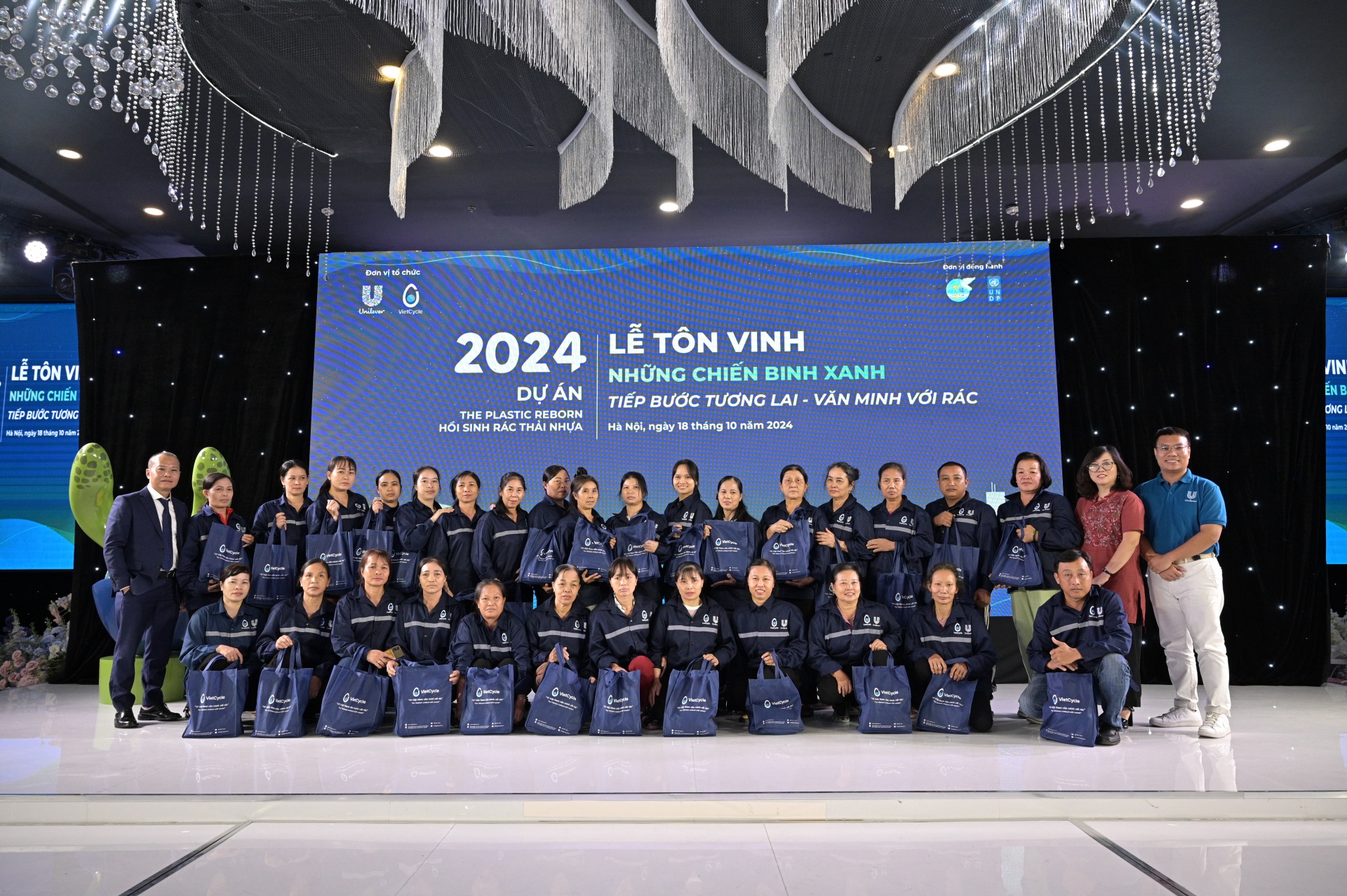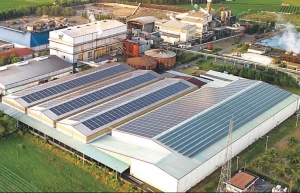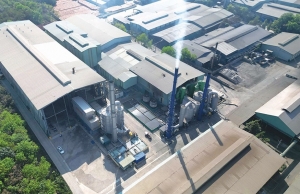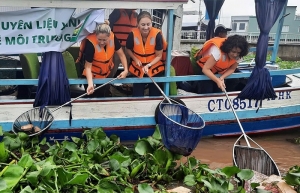Honouring ‘Green Warriors’ on Vietnamese Women’s Day
The event is part of an annual series under the 'Plastic Reborn' project, implemented since 2021 by VietCycle in collaboration with Unilever Vietnam.
 |
| Ceremony honouring the ‘Green Warriors’ marking the Vietnamese Women’s Day. Photo: VietCycle |
The event featured representatives from diverse management agencies and international organisations, including the Ministry of Natural Resources and Environment (MoNRE), Hanoi Department of Natural Resources and Environment, UN Women in Vietnam, International Union for Conversation of Nature, Alliance End Plastic Waste, Vietnam Women Union, Hanoi Women Union, Unilever Vietnam, CHEMONICS, Dow Chemical Vietnam, Alba, executive representatives of businesses in the sector, and media agencies.
 |
| Caroline Nyamayemombe, Country Representative, UN Women Vietnam, giving remarks. Photo: VietCycle |
Caroline Nyamayemombe, country representative of UN Women Vietnam said, “Our ‘Green Warriors’ are more than just waste collectors; they are environmental pioneers, dedicated to preserving our planet for future generations. Their tireless efforts to clean up our communities and recycle plastic waste are a testament to their resilience, strength, and unwavering commitment to a sustainable future.”
Nyamayemombe also praised the ‘Plastic Reborn’ initiative by Unilever and VietCycle, which has made a tangible impact on the environment by reducing plastic waste while empowering waste collectors.
“By providing them with essential personal protective equipment, hygiene products, and capacity building on safe waste collection and management, as well as upskilling them for future roles in recycling factories, and currently offering 600 volunteer health insurance cards, this initiative demonstrates a strong commitment to the wellbeing and gender equality of waste collectors,” she said.
Ho Trung Kien, deputy director of the Pollution Control Department at the MoNRE, noted the many initiatives launched by associations, businesses, and international organisations in response to the government’s call to combat plastic waste and reduce environmental pollution caused by non-biodegradable plastic bags and single-use plastics.
Among these, VietCycle stands out as a key player in plastic waste collection and recycling. The company has committed to collaborating with the Vietnamese government to reduce 90 million plastic packages and cut 54 million kg of carbon emissions by the end of 2027.
 |
| Ceremony honouring the ‘Green Warriors’ marking Vietnamese Women’s Day. Photo: VietCycle |
“This ceremony today recognises and appreciates the critical roles and contributions of female waste collectors in the waste management value chain and in environmental protection,” said Trung.
Le Thi Hong Nhi, deputy general director of Communications, External Affairs, and Sustainable Development at Unilever Vietnam, highlighted that more than 30 per cent of plastic waste is collected by informal waste collectors, 90 per cent of whom are women. “They are a vital link in the plastic circular economy that Unilever has been pursuing for many years,” she said.
Nhi added that the Extended Producer Responsibility (EPR) regulations and the roadmap towards a circular economy represent a significant step forward, offering new opportunities for companies, waste collectors, and recyclers.
“We understand that this is a challenging and unstable profession, but it has a positive impact on the environment. Unilever has and will continue to support female waste collectors with safe and hygienic protective gear and training, while also helping to improve their livelihoods. This ensures they are well-prepared to contribute to the growth of Vietnam’s recycling industry,” she added.
Hoang Duc Vuong, chairman of VietCycle, emphasised that the Plastic Reborn project provides a foundational platform for the development of the XanhNet circular ecosystem, which covers the entire waste management chain—from collection to sorting, baling, and recycling facilities.
“In the coming year, we plan to implement Extended Producer Responsibility (EPR), supported by EPR fees that will be shared across the value chain, benefiting collectors, sorters, balers, and recycling plants, and ultimately increasing the income of these Green Warriors,” said Vuong.
VietCycle also plans to collaborate with the Beer, Alcohol and Beverage Association and the Vietnam Electronics Industries Association to expand the range of recycled products, moving towards a circular economy in Vietnam.
In recent years, VietCycle has worked to build a collection system involving over 5,000 waste collectors. In partnership with Unilever Vietnam, the Plastic Reborn project has undertaken many practical actions to support vulnerable women, with the goal of enabling everyone to lead a better life while transforming waste into valuable resources for the country.
Vietnam’s Environmental Protection Law of 2020 introduced new policies that underscore a commitment to circular economy development, viewing waste as a valuable resource and promoting waste separation, recycling, and plastic waste reduction.
Notably, by December 31, 2024, it will be mandatory to sort household waste nationwide. The EPR regulations and the roadmap towards a circular economy will be a key step forward, offering opportunities for companies, waste collectors, and recyclers, and recognising the important contributions of informal waste collectors, ultimately improving their livelihoods.
 | Pricing switch up ahead for solid waste and biomass The Ministry of Industry and Trade is to publish a new pricing framework applicable to refuse and biomass power plants, with a possibility that Vietnam Electricity will negotiate the purchase price using this framework. |
 | Investors grapple with PPP waste projects Athough investors have options to fund development of waste treatment plant projects under the public-private partnership model, experience and awareness are still weak. |
 | Vietnam urged to accelerate fight against plastic waste Vietnam is being cautioned about the increasing levels of plastic waste entering its water environments, undermining both environmental quality and the country’s sustainable development efforts. |
What the stars mean:
★ Poor ★ ★ Promising ★★★ Good ★★★★ Very good ★★★★★ Exceptional
Related Contents
Latest News
More News
- Tet event in Japan celebrates success of 14th National Party Congress (January 25, 2026 | 10:04)
- 14th National Party Congress wraps up with success (January 25, 2026 | 09:49)
- Congratulations from VFF Central Committee's int’l partners to 14th National Party Congress (January 25, 2026 | 09:46)
- List of newly-elected members of 14th Political Bureau announced (January 23, 2026 | 16:27)
- 14th Party Central Committee unanimously elects To Lam as General Secretary (January 23, 2026 | 16:22)
- List of members of 14th Party Central Committee announced (January 23, 2026 | 09:12)
- Highlights of fourth working day of 14th National Party Congress (January 23, 2026 | 09:06)
- Press provides timely, accurate coverage of 14th National Party Congress (January 22, 2026 | 09:49)
- Press release on second working day of 14th National Party Congress (January 22, 2026 | 09:19)
- Minister sets out key directions to promote intrinsic strength of Vietnamese culture (January 22, 2026 | 09:16)

 Tag:
Tag:


























 Mobile Version
Mobile Version